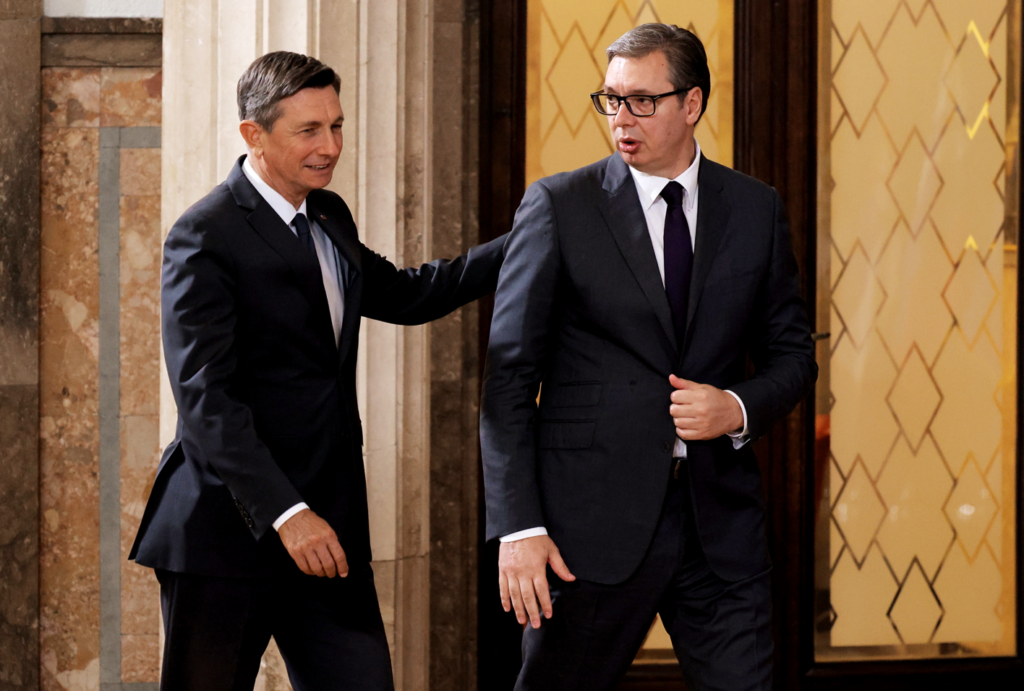“How could I explain to people that we are imposing sanctions against Russia but not against Slovenia? Russia has not violated Serbia’s territorial integrity, while Slovenia has. We have not imposed sanctions against Slovenia but are instead trying to have the best possible relations with you,” said Serbian President Aleksander Vučić, who then added that Slovenia – like France, Germany and the USA – had recognised Kosovo, which Serbia believes is a violation of international law, the UN Charter and the UN Security Council resolutions. This story, he said, is not over yet. He expressed his gratitude to President Borut Pahor for “trying to understand Serbia’s position.” “This is a serious matter. According to international diplomatic practice, in order to defend national interests, the Ministry of Foreign Affairs must send a note of protest to Belgrade within a matter of minutes and summon Serbia’s Ambassador Zorana Vlatković to the Ministry of Foreign Affairs today, so she can explain the situation: she should offer an explanation, an apology, an assurance that this will not happen again… and the rest, according to international law,” commented international law expert Dr Miha Pogačnik, who believes that this is a major incident.
On Saturday, President of the Republic of Slovenia Borut Pahor met with his Serbian counterpart, Aleksander Vučić, in Belgrade – the former was there in the context of preparations for the Brdo-Brioni Summit, which he will host in Brdo pri Kranju on the 12th of September. They discussed the European perspective of the Western Balkans and the peace, stability, and development of the region; and regarding the war in Ukraine, Pahor warned that it was not contributing to stability in the region. He called for the acceleration of accession negotiations for Serbia, Montenegro, and North Macedonia and for Bosnia and Herzegovina to be granted candidate status by the end of the year. When asked by the press whether Serbia would join the European sanctions against Russia over the attack on Ukraine, Vučić replied that Serbia would have an obligation to follow the European Union’s Common Foreign and Security Policy just before joining the alliance, the Serbian news agency Tanjug reported. However, he pointed out that no one had informed the country yet that it was on the verge of membership, and no one seemed to be planning to do so – this was then followed by his statement that Slovenia had violated Serbia’s territorial integrity. If Serbia were 100 percent sure of its European future, Pahor said, it would also reconsider its relations with Russia, the Slovenian Press Agency reports.
In fact, a note of protest should have been sent a few days ago already, when Serbian Minister of the Interior, Aleksandar Vulin, responding to the Slovenian President’s call for Serbia to abandon the idea of a so-called Serbian Council and start moving more actively towards the EU, said that the secession of Slovenia had started the war in Yugoslavia, in which thousands of people died. “No one has died because of the ‘Serbian Council,’ but Slovenia’s ‘self-determination for secession’ started a civil war,” he stressed, explaining that the Serbian Council is neither an official definition nor a policy of Serbia, but just a natural need of the Serbians for unity and to live united. To argue that Slovenians had the right to leave Yugoslavia and that Serbians had no right to decide for themselves was, in his words, hypocritical and indefensible. At the Bled Strategic Forum, Pahor also touched on Serbia, which, he said, should, among other things, give up the idea of a so-called Serbian Council, reject the separatist tendencies in Bosnia and Herzegovina, and work towards dialogue with Pristina, Kosovo. “If Serbia were to be won over to the side of Western Europe, that would make an enormous contribution to solving the problems in Bosnia and Herzegovina, as well as to progress in the Belgrade-Pristina dialogue,” said Pahor, who believes that Serbia will play a key role if there are divisions in the Western Balkans, especially as a traditional ally of Russia – and may only be willing to sever these ties if it receives firm assurances from the European Union.
Under international law, the role of diplomatic protest is to avoid the presumption of tacit acceptance of the other side’s thesis; what matters is the speed of the response
“In fact, we do not have to guess what the background of the statement of the President of Serbia was (Kosovo, the Greater Serbia, C2H5OH…). This is an extremely serious accusation under international law, and Slovenian diplomacy must demand and obtain an explanation and an apology. If it cannot do so, we can only pretend to be a sovereign state,” commented Dr Miha Pogačnik, an expert in international law, stressing that the Prime Minister’s statement legally binds the country and creates serious international legal consequences. “H. E. Ambassador Vlatković of Serbia is an excellent diplomat and is probably already waiting to be summoned to our Ministry of Foreign Affairs, while also wondering why our people are just pretending like nothing happened,” he remarked and raised the question of what the Ministry of Foreign Affairs, which also has a 24-hour-service, is doing.
“Under international law, the role of diplomatic protest is to avoid the presumption of tacit acceptance of the other side’s thesis! And the effect of the protest depends on its speed. By waiting, in my opinion, de jure and de facto damage is being done to the Slovenian position,” warned the professor and international lawyer. He also pointed out that we should have already harshly protested against Minister Vulin’s statement that Slovenia separated from the former Yugoslavia: “There is a huge difference between dissolution (Slovenia’s thesis) and separation (Milošević’s thesis) in terms of issues of the succession of states in international law. Ministry of Foreign Affairs, did you do anything about this?”
Sara Bertoncelj


